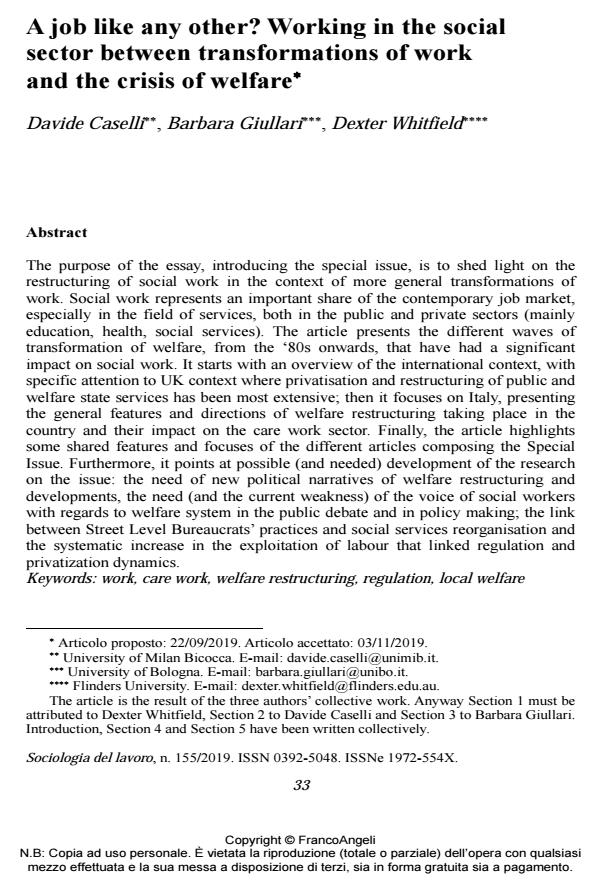A job like any other? Working in the social sector between transformations of work and the crisis of welfare
Journal title SOCIOLOGIA DEL LAVORO
Author/s Davide Caselli, Barbara Giullari, Dexter Whitfield
Publishing Year 2019 Issue 2019/155
Language English Pages 21 P. 33-53 File size 224 KB
DOI 10.3280/SL2019-155002
DOI is like a bar code for intellectual property: to have more infomation
click here
Below, you can see the article first page
If you want to buy this article in PDF format, you can do it, following the instructions to buy download credits

FrancoAngeli is member of Publishers International Linking Association, Inc (PILA), a not-for-profit association which run the CrossRef service enabling links to and from online scholarly content.
The purpose of the essay, introducing the special issue, is to shed light on the restructuring of social work in the context of more general transformations of work. Social work represents an important share of the contemporary job market, especially in the field of services, both in the public and private sectors (mainly education, health, social services). The article presents the different waves of transformation of welfare, from the ‘80s onwards, that have had a significant impact on social work. It starts with an overview of the international context, with specific attention to UK context where privatisation and restructuring of public and welfare state services has been most extensive; then it focuses on Italy, presenting the general features and directions of welfare restructuring taking place in the country and their impact on the care work sector. Finally, the article highlights some shared features and focuses of the different articles composing the Special Issue. Furthermore, it points at possible (and needed) development of the research on the issue: the need of new political narratives of welfare restructuring and developments, the need (and the current weakness) of the voice of social workers with regards to welfare system in the public debate and in policy making; the link between Street Level Bureaucrats’ practices and social services reorganisation and the systematic increase in the exploitation of labour that linked regulation and privatization dynamics.
Keywords: Work, care work, welfare restructuring, regulation, local welfare
- The Invisible Labour of Solidarity: The Glorification of Volunteering and the Feminization of Work in the History of the Italian Social and Solidarity Economy Valentina Castellini, in Voluntas: International Journal of Voluntary and Nonprofit Organizations /2025 pp.315
DOI: 10.1007/s11266-025-00719-1
Davide Caselli, Barbara Giullari, Dexter Whitfield, A job like any other? Working in the social sector between transformations of work and the crisis of welfare in "SOCIOLOGIA DEL LAVORO " 155/2019, pp 33-53, DOI: 10.3280/SL2019-155002